Cambodia's Historic Leader Presents Lessons in Reconciliation, Peace and Development
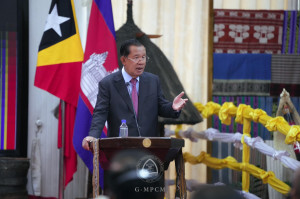
An edition of the Presidential Lecture Series took place today, May 9th, 2025, at the Nicolau Lobato Presidential Palace in Dili, with the participation of Samdech Akka Moha Sena Padei Techo Hun Sen, current President of the Senate of the Kingdom of Cambodia and former Prime Minister of the country. The session was moderated by the Minister for the Presidency of the Council of Ministers, Agio Pereira, and took place under the theme “Lessons from Hun Sen - From Genocide and Poverty to Freedom and Prosperity”. The event brought together the Heads of State and Government, members of the Executive, representatives of the diplomatic corps, academics and students, in a moment of reflection on the challenges of building peace and national development in post-conflict contexts. 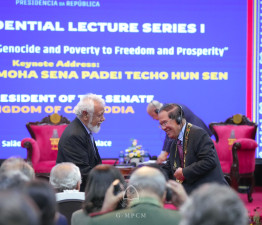
In opening the session, the President of Republic, José Ramos-Horta, stressed that “the Presidency Lecture Series is an initiative dedicated to promoting reflection, open dialogue and the exchange of transformative ideas”, adding that these lectures “stand as a beacon of meaningful debate on issues of national, regional and global importance”. He also stressed that “we hope these talks will inspire current and future generations of leaders, policymakers and agents of change in shaping the destiny of our country”.
In welcoming the guest speaker, the Head of State expressed his “profound gratitude” and declared himself “deeply honored” by Hun Sen's presence “and by the opportunity to learn from his extraordinary path and leadership - a leadership that has guided Cambodia from the ashes of conflict to a path of peace, stability, economic growth and sustainable development”. He also stressed that “under his leadership, Cambodia has also been one of the strongest and most consistent advocates of Timor-Leste's aspiration to become a full member of ASEAN - an aspiration we hope to see realized later this year.”
In his speech, Hun Sen traced a personal and political journey marked by extreme challenges, from the horrors of the Khmer Rouge regime - which killed more than three million Cambodians - to leading a successful peace and reconstruction process. “In 1985, I became Prime Minister of Cambodia when I was just 32 years old,” he said. Two years later, “in 1987, I identified and developed a five-point strategy to achieve total peace for my country, with the clear conviction that continuing to wage war would only prolong the suffering of the people indefinitely.” 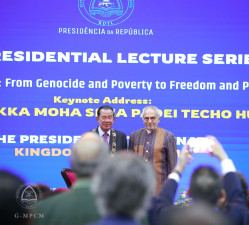
This strategy included, among other things, the withdrawal of Vietnamese troops, the holding of free elections with international observers, the creation of a neutral coalition government, the voluntary repatriation of refugees and the holding of an international conference with the support of major powers and neighboring countries. From this process emerged the Paris Peace Accords of 1991, which allowed Cambodia to re-establish relations with the international community and adopt a new constitution in 1993 that enshrined a constitutional monarchy, multi-party democracy and a market economy.
“To achieve total peace, [Hun Sen initiated] the Win-Win Policy in 1996, an innovative approach to reconciliation that allowed the remnants of the Khmer Rouge to be peacefully integrated without resorting to violence”. “This policy successfully ended almost three decades of civil war without firing a single shot,” he said, explaining that the success was based on offering ‘Three Guarantees’ - protection of life, continuity of functions and safeguarding property - as incentives for voluntary surrender and national integration. “At the time, I didn't demand that they hand in their weapons. They continued to bear arms and hold the same positions, albeit under the control of the Royal Government. This was the key element in building trust,” he added.
The Cambodian leader emphasized that “true justice is ‘justice for those who lost their lives, and peace for the survivors and for society as a whole’”, having created the first international hybrid tribunal as an expression of this reconciliation. He also said that lasting peace requires not only an end to conflict, but also “national unification, reconciliation, social justice and sustainable and inclusive development”. 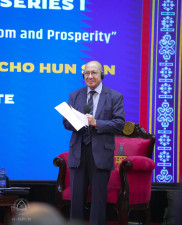
Hun Sen explained the economic development model followed by Cambodia, based on three successive strategies: the Triangular Strategy (1998-2003), focusing on pacification, regional integration and institutional reforms; the Rectangular Strategy (2003-2023), focusing on economic growth, job creation, equity and infrastructure modernization; and the current Pentagonal Strategy (2023-2028), which aims to consolidate progress and achieve the goal of making Cambodia a high-income country by 2050.
In the final part of his talk, he highlighted three fundamental lessons from the Cambodian experience. The first is that “ownership of the nation's destiny is the most valuable asset for preserving national unity”. The second lesson is the value of peace: “War may be easy to start, but it took Cambodia almost 30 years to end it”. For this reason, he argued that “we must strive to educate the people about the value of peace, because without peace we cannot properly speak of the words ‘human rights, democracy and development’”. The third lesson refers to the importance of a culture of continuous dialogue and reconciliation: “Even if peace is achieved, it will not last without national unification, reconciliation, social justice and sustainable and inclusive development.”
He concluded his speech by expressing the hope that his message would contribute to “a deeper understanding of the value of peace and the difficulties in peacebuilding, and reconciliation, as well as the difficulties in sustaining long-term peace, He added: “I sincerely hope that Cambodia’s experience in peacebuilding and nation-building will contribute to building a culture of dialogue and fostering a “Win-Win” approach to resolving protracted conflicts, which is an essential foundation for achieving peaceful conflict resolution and building a genuine, lasting and inclusive peace.” 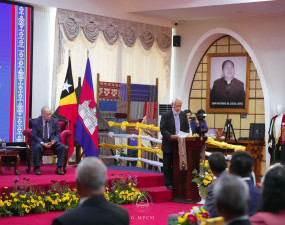
After the lecture, Hun Sen was awarded the Grand Collar of the Order of Timor-Leste, the highest decoration of the State, awarded by the President of the Republic in recognition of his contributions to strengthening bilateral relations and his continued support for Timor-Leste accession process to ASEAN. During his speech, President José Ramos-Horta had already praised Hun Sen's career, saying: “Dear friend, your life’s journey—from soldier in the killing fields to Cambodia’s longest-serving head of government, and now President of the Senate—embodies the spirit of resilience, leadership, and unwavering dedication to the service of your people”.
The Prime Minister, Kay Rala Xanana Gusmão, in his speech at the closing of the event, thanked Hun Sen for his presence and said it was “an honor to make closing remarks after such a significant lecture.” He acknowledged the guest's generosity in sharing his reflections “with such honesty and clarity” and stressed that “his words have given us much to think about.”
The Head of Government highlighted the career of Hun Sen who "led his people through one of the most difficult and complex periods in modern history. From the devastation of war and genocide, he managed to unify and then rebuild the country." He added that “we recognize his leadership with great respect and welcome him as a senior statesman of our region.”
Referring to the parallels between the histories of the two countries, he recalled that "in Timor-Leste, we understand well the long road to reconstruction. We also know that independence was not the end of our struggle, but the beginning of the difficult work of building peace and a state." He also stressed that “our path was made with much sacrifice” and that "we stand on the shoulders of giants. Leaders like Nicolau Lobato and Nino Konis Santana; and the many thousands of Timorese martyrs who gave their lives for our freedom." 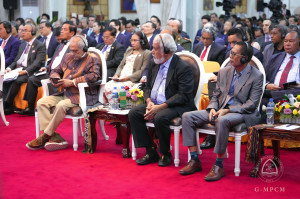
Recalling the regional impact of the Cold War conflicts, the Prime Minister noted that “as with Timor-Leste, so too Cambodia was caught up in that larger conflict.”
He highlighted that Hun Sen "became a resistance leader who fought to restore order and unify his country. He led his people out of a dark period; and he reconstructed a nation from the bottom ." He stressed that “he should be proud of the history that he has told us today - of how he used peaceful methods to achieve peace and national reconciliation following a period of tragedy, division and genocide.”
Praising the results achieved, he said that the former Prime Minister of Cambodia “consolidated peace, built the capacity of State institutions, strengthened good governance, built national infrastructure and developed a strong economy”, stressing that "this was not easy. It required steady leadership, a constant focus on reconciliation and the promotion of a ‘culture of dialogue’."
Xanana Gusmão considered that “Cambodia's trajectory over the last four decades is a powerful example of how a country can recover from devastation” and that “in addition to being a successful state, Cambodia is now an active player in regional and international affairs.” 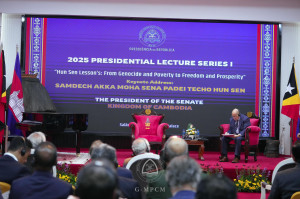
He also referred to bilateral cooperation, pointing out that “Cambodia contributes to global discussions with clarity and a sense of purpose” and “it supports others, including Timor-Leste, through practical cooperation, including in agriculture, education and tourism.”
Regarding Timor-Leste's accession to ASEAN, he said that "this is not just a foreign policy objective. It reflects our identity, our direction and our conviction that our future lies in the region to which we belong, “ “Thanking Hun Sen for his support and stressing:” our people will not forget the support that His Excellency has given to our country."
Addressing the youth present, he said: "To the students and future leaders of our country - I encourage you to reflect deeply on today's lessons. Leadership is not about finding perfect solutions or immediate results. It is knowing how to listen and promote dialogue; it is understanding that change takes time, and that progress is built over years, not days."
He concluded his speech with a message of gratitude: "Your Excellency, thank you for your leadership and solidarity. Thank you for reminding us that even the most difficult histories can lead to hope and a better future. And thank you for being a true friend of our country."










































